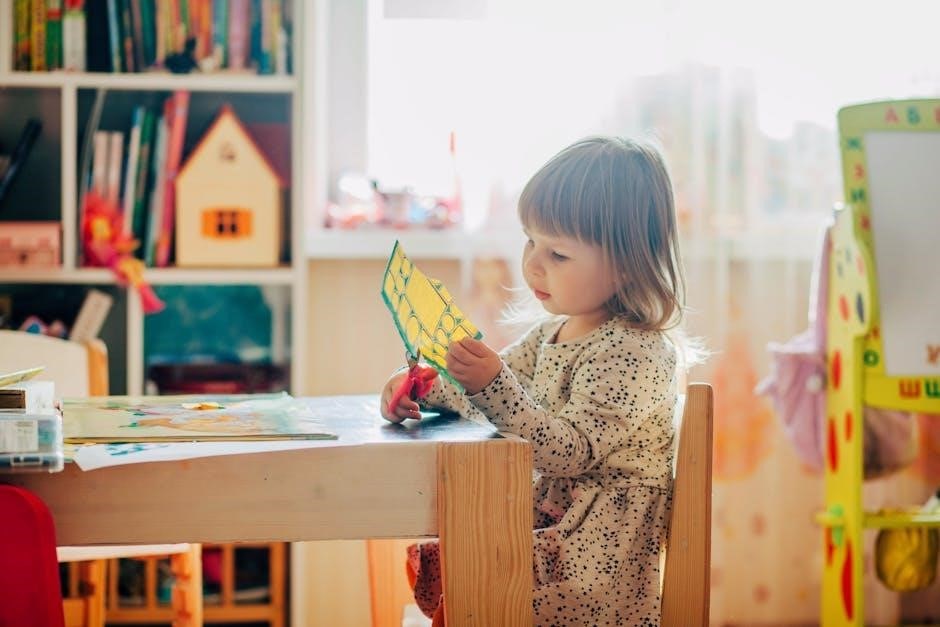
Effective learning is fundamental for all learners, fostering essential skills and curiosity. It is rooted in educational frameworks like the early years foundation stage, ensuring holistic development and lifelong growth.
1.1 Importance of Effective Learning in Education
Effective learning is crucial for fostering engagement, skill development, and academic success. It ensures students are well-prepared for future challenges, promoting critical thinking and creativity. By emphasizing well-being and interactive methods, effective learning creates inclusive environments where all learners thrive. It aligns with curriculum frameworks like the Early Years Foundation Stage, ensuring a strong foundation for lifelong education and personal growth.
1.2 Overview of the Characteristics of Effective Learning
Effective learning is characterized by engagement, motivation, and adaptability. It involves active participation, critical thinking, and creativity. Key traits include playing and exploring, active learning, and creating and thinking critically. These qualities foster curiosity, focus, and resilience, enabling learners to navigate challenges and achieve their goals. By integrating these characteristics, education ensures a holistic development, preparing individuals for lifelong learning and success.
Key Characteristics of Effective Learning
Effective learning involves playing and exploring, active engagement, and critical thinking. These traits foster curiosity, focus, and resilience, helping learners thrive and achieve their educational goals.
2.1 Playing and Exploring
Playing and exploring are crucial for effective learning, enabling children to discover and engage with their environment. Through play, they develop curiosity, creativity, and problem-solving skills. Activities like exploring objects, events, and people encourage active learning, fostering a deeper understanding of the world. This approach helps build confidence and independence, laying a strong foundation for future academic success and lifelong learning.
2.2 Active Learning
Active learning involves maintaining focus, exploring environments, and engaging in hands-on activities. It fosters critical thinking, creativity, and problem-solving skills. By staying curious and motivated, learners develop a deeper understanding of concepts. Active learning encourages independence and resilience, helping individuals adapt to new challenges. This approach ensures learners remain engaged and invested in their educational journey, laying a strong foundation for future success and personal growth.
2.3 Creating and Thinking Critically
Critical thinking and creativity are essential skills in effective learning. Learners generate ideas, solve problems, and evaluate information logically. Encouraging innovation and independent thought, this characteristic helps individuals connect ideas and explore possibilities. It fosters a deeper understanding of concepts and promotes confidence in expressing unique perspectives. By nurturing critical thinking, learners develop a growth mindset, enabling them to approach challenges with curiosity and creativity, ultimately preparing them for complex real-world issues.

Educational Studies on Effective Learning
Educational studies highlight effective learning through teacher characteristics and methods like gamification, enhancing skill development and engagement in adult education, as identified by researchers like I. Mamaev and OI Mironova.
3.1 Identifying Characteristics of Effective Teachers
Research highlights that effective teachers exhibit clear communication, adaptability, and the ability to inspire. They foster engagement through innovative methods like gamification, as noted by I. Mamaev and OI Mironova. These educators prioritize skill development and critical thinking, ensuring learners remain motivated and focused. Their ability to connect with students and adapt teaching strategies enhances overall learning outcomes, making them indispensable in educational settings. Such traits distinguish effective teachers and promote meaningful education.
3.2 Gamification as a Method of Teaching Adults
Gamification emerges as a powerful tool in adult education, enhancing engagement and motivation. According to OI Mironova’s study, it effectively trains complex skills through interactive elements. By incorporating game-like mechanics, such as rewards and challenges, learners remain focused and curious. This method aligns with the principles of active learning, fostering a dynamic and enjoyable educational experience. Its ability to simulate real-world scenarios makes it particularly effective for adult learners seeking practical skill development. Gamification thus becomes a key element in modern educational strategies, driving successful outcomes for adults.
Interactive Methods in Teaching
Interactive methods significantly enhance learning by engaging students through dynamic activities. They foster active participation, critical thinking, and practical skill development, proving more effective than traditional approaches.
4.1 Effectiveness of Interactive Methods in English Teaching
Interactive methods in English teaching are highly effective, fostering engagement and boosting language acquisition. Activities like role-plays, group discussions, and multimedia tools enhance vocabulary, grammar, and communication skills. These methods encourage active participation, critical thinking, and creativity, making learning more enjoyable and impactful. They also cater to diverse learning styles, ensuring students grasp concepts effectively and retain information better compared to traditional lectures. This approach aligns with modern educational practices and promotes a dynamic learning environment.
4.2 Role of Teaching Games and Game Exercises
Teaching games and exercises are powerful tools that enhance learning by making it engaging and interactive. They encourage active participation, teamwork, and problem-solving skills, while fostering creativity and critical thinking. Games create a relaxed environment, reducing anxiety and increasing motivation. By incorporating elements of fun, they help learners retain information better and develop essential life skills. This method aligns with effective learning characteristics, promoting a dynamic and enjoyable educational experience for students of all ages.
Characteristics of Learners
Learners exhibit curiosity, resilience, and creativity, essential for effective learning. They demonstrate critical thinking, problem-solving, and adaptability, fostering a deep understanding of skills and knowledge in education.
5.1 Skills and Knowledge Development
Skill and knowledge development are crucial for effective learning, enabling learners to explore, create, and think critically. These skills grow from prime areas, providing contexts for deeper understanding. Learners develop problem-solving abilities, creativity, and resilience, fostering a strong foundation for lifelong learning. Interactive methods and well-being focus enhance these developments, ensuring learners are equipped with essential skills and knowledge to thrive in educational and real-world environments.
5.2 Prime Areas of Learning
Prime areas of learning form the foundation of effective education, encompassing essential skills like communication, physical development, and emotional intelligence. These areas are interconnected, fostering a holistic approach to learning. They provide the building blocks for more complex skills, ensuring learners develop confidence and curiosity. By focusing on these core areas, educational frameworks like the Early Years Foundation Stage create a strong base for future academic and personal growth.
Evidence-Based Practices in Instruction
Evidence-based practices ensure effective instruction by focusing on functional skills and knowledge. They incorporate structured methods like programmed learning, aligning teaching strategies with proven outcomes to enhance learning efficiency.
6.1 Functional Skills and Knowledge
Functional skills and knowledge are crucial for effective learning, enabling learners to apply abilities in real-world contexts. These skills, such as problem-solving and communication, are developed through evidence-based practices. They form the foundation of programmed instruction, which uses structured, learner-driven approaches to ensure mastery. By focusing on these skills, educators create a framework that supports long-term understanding and practical application, aligning with the characteristics of effective learning outlined in educational frameworks.
6.2 Programmed Instruction and Its Elements
Programmed instruction integrates machine-driven and learner-driven tools, offering a structured approach to learning. It employs a combination of visualization tools to enhance understanding, ensuring each element builds on the previous one. This method supports functional skills by providing clear, step-by-step guidance, making it effective for diverse learners. Its systematic design aligns with evidence-based practices, fostering a deeper grasp of complex concepts and promoting independent learning, as highlighted in effective learning frameworks.

The Role of Well-Being in Learning
Well-being is crucial for effective learning, as it enhances focus and engagement. State programs emphasize student well-being, aligning with educational policies to support holistic development and academic success.
7.1 Focus of State Programs on Student Well-Being
State programs prioritize student well-being, recognizing its impact on academic performance. Initiatives include mental health support, safe learning environments, and access to resources. These efforts foster resilience and emotional stability, creating a foundation for effective learning and overall development.

Application of Effective Learning Characteristics
Effective learning characteristics are applied through play, exploration, and critical thinking. These methods enhance engagement, creativity, and problem-solving skills, fostering a deeper understanding and love for learning.
8.1 Supporting Learning Through Play
Play is a cornerstone of effective learning, enabling children to explore, discover, and apply knowledge. Through playful activities, learners develop creativity, problem-solving skills, and critical thinking. Play fosters curiosity and engagement, allowing children to express ideas and build confidence. It encourages active participation, collaboration, and experimentation, laying the foundation for lifelong learning and personal growth.
8.2 Maintaining Focus and Curiosity
Maintaining focus and curiosity are vital for effective learning. Learners who stay engaged and curious demonstrate high levels of energy and concentration. They explore the world around them using their senses, showing interest in objects, events, and people. This trait fosters a mindset that is open to new ideas and experiences, enhancing their ability to think critically and solve problems. Curiosity drives continuous exploration and discovery, fueling personal and academic growth.

Curriculum Guidance for Effective Learning
Non-statutory guidance like Development Matters provides a framework for early years education, focusing on prime and specific areas of learning to support child development effectively.
9.1 Development Matters in Early Years Foundation Stage
Development Matters offers non-statutory guidance for the Early Years Foundation Stage, outlining prime and specific areas of learning. It supports educators in understanding children’s developmental stages, emphasizing play-based learning and the characteristics of effective learning. This framework helps create engaging activities that foster curiosity, exploration, and critical thinking, ensuring a solid foundation for future academic success and personal growth.
Bronfenbrenner Model and Effective Learning
The Bronfenbrenner model reflects the themes of the Early Years Foundation Stage, positioning the unique child at the center. It emphasizes the impact of positive relationships and environments on learning, aligning with the characteristics of effective learning to foster holistic development and curiosity-driven growth.
10.1 Reflection in Early Years Foundation Stage Themes
Reflection is a cornerstone of the Early Years Foundation Stage, enabling practitioners to observe and support children’s learning journeys effectively. By understanding how children engage with their environment and peers, educators can tailor activities that nurture curiosity and critical thinking. This approach aligns with the characteristics of effective learning, fostering a deeper understanding of each child’s unique development and learning style, ensuring personalized and impactful educational experiences.
Challenges and Strategies in Implementing Effective Learning
Challenges include limited resources and unmotivated students. Strategies involve interactive methods, gamification, and fostering a supportive environment to enhance engagement and address barriers effectively.
11.1 Overcoming Barriers to Effective Learning
Common barriers to effective learning include lack of engagement, limited resources, and unmotivated students. Strategies such as interactive methods, gamification, and fostering curiosity can address these challenges.
Teachers should also focus on well-being, as it directly impacts learning outcomes. State programs emphasize student well-being, highlighting its importance in creating a supportive educational environment.
Effective learning characteristics, such as curiosity and critical thinking, are vital for skill development and lifelong growth, fostering engaged and motivated learners in all educational settings.
12.1 Summary of Key Characteristics and Their Impact
The key characteristics of effective learning, such as curiosity, critical thinking, and active engagement, significantly enhance educational outcomes; They foster creativity, problem-solving, and lifelong skills, ensuring learners remain motivated and adaptable. These traits promote emotional and cognitive well-being, enabling individuals to thrive in diverse environments. By integrating these characteristics, educators create a supportive framework that nurtures holistic development and prepares learners for future challenges.